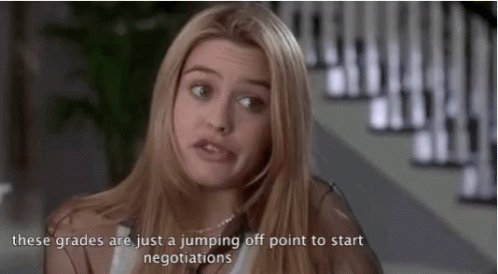Instead of focusing on learning, there is a lot of negotiation: can we find one or two points on the midterm as the student is just on the verge of A-?
Everyone is just on the verge of the next grade.
And all the evals are not about the class but about the grading. Really? /2
Is the grade at all informative? If you are just below the A- or just above that, is that giving the student any information about how to improve their knowledge or skills? No. t is just a useless, demoralizing & stressful smoke screen /3
Students' abilities, challenges, and learning are multidimensional. Providing feedback on these many dimensions is much more useful for promoting growth and learning than are quantized unidimensional grades. /3.5
There is an alternative: do away with grades. Keep the feedback -- lots of it (this is not less work for us teachers) but never summarize it in a unidimensional uninformative number (unless you absolutely have to). /4
There is research to support this: "Why grade? To give students feedback, a professor might say. To measure learning. To motivate.
Here’s the problem: Decades of research undercuts these assumptions." (starting from Ruth Butler in the 80's at Hebrew U.)/5
https://t.co/y0WZ218QMm
Here is where I learned all about this, from Starr Sackstein who is one of the founders of "Teachers Throwing out Grades" (#TToG), interviewed for Cult of Pedagogy. Well worth a listen. Also look up #ungrading.
/6
https://t.co/tKrygx1Mix
(oh, and
https://t.co/NJJ1RK014S has many other gems; check out
https://t.co/z7oEsuL67S) /6.5
My specific implementation is 2 semesters old, and I love it so far:
1. Tell students in advance why you are doing this. Get buy-in. I basically tell them all the above.
2. Get them to focus on what they want to get out of this course, rather than what grade I'll give them. /7
Have them set themselves S.M.A.R.T goals with a dedicated worksheet. They track their goals on that sheet throughout the semester. I comment on the goals, and meet with them to discuss progress a couple of times during the semester. This is a living doc that can change. /8
In a freshman course, I had them focus the goals on skills, in an advanced course, goals had to touch on each of the course components. When COVID-19 hit, we revised goals to adjust to circumstances, and added a personal wellness goal. Here is a template.
https://t.co/vQ8NYtikEw
Their goals were uniformly thoughtful. Some very detailed, some setting too high a bar (I talked them down), some not fully aligned with the course material (a good chance to adjust expectations).
Importantly it puts the responsibility on them: what do YOU want to learn here?/10
Then teach with a lot of feedback. If students presented they got feedback from me and from colleagues. Paper drafts were due early and everyone got peer reviews. Make sure there are chances to act on feedback and improve (>1 presentation; unlimited makeups on papers) /11
Students loved it. They thrived. The learning outcomes were amazing, and they learned to see their learning differently -- as a process, not a goal. And throughout we were on the same side: I and the student both have the goal of helping them achieve their goals. /12
Also, I planned course components thinking about skills they can learn: group work, group research projects, class presentations, reading prompts, writing an op ed. No busy work. If a course component doesn't clearly serve their growth, why should they do it? /13
In the second course, I also added the method of specs grading -- they can choose components to apply themselves to, and are free to choose to drop things. See attached syllabus (it is long -- part of my syllabus review towards decolonizing the classroom)
https://t.co/DQU7fil4TI
At the end of the course we met to talk about their final grade. I came with an idea, and asked them to suggest a grade and explain why (with data!). In most cases we agreed or I suggested higher than they did. In a couple they convinced me up. In one I stood my ground down. /15
No one slacked off throughout the semester, and I felt they were all there all the time. Fewer late assignments than when I had a penalty for lateness... even though there was no grade and no penalty! Nothing beats intrinsic motivation. They did it because they wanted to. /16
I enjoyed this way of teaching much more. I think students learned much more. They will take some of this to other courses. Like one student said "you gave us the skills without the pressure. This was the first course I took that made space for personal development." /17
That is why we teach. If I can help it, I am never going back to grades.
But I have a lot more to learn about this method. I am sure it will only get better.
ps. Of course having the right TA was critical. Thank you,
@sashankpisupati! This was so fun to do together!
/fin




